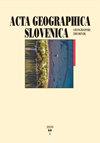南极洲泰勒谷CaCO3壳层的同位素地球化学特征及其成因
IF 0.9
4区 地球科学
Q3 GEOGRAPHY, PHYSICAL
引用次数: 6
摘要
碳酸钙(CaCO3)结垢发生在大多数沙漠土壤中,包括极地土壤,这种结垢保存了影响这些土壤的地球化学、水文和大气过程的记录。我们收集了一系列在南极洲麦克默多干谷(约78°S lat.)泰勒谷土壤和耕地的地表岩石下发现的CaCO3结壳。对这些结垢进行了87Sr/86S、δ18O和δ13C的分析,以确定它们与下层土壤以及它们接触的材料之间的关系,并确定控制其形成的过程。在除一种情况外的所有情况下,同位素数据表明,这些结壳的Sr来源并非与其相关的岩石。Sr(以及类似的Ca)的主要来源要么来自通过风成过程沉积的灰尘,要么来自土壤中耕作材料的骨料。Taylor Valley结壳的δ13C值范围为5.7至11.0‰,与大气CO2的碳源一致。δ18O值范围从-8.1‰到-11.2‰,比泰勒谷大气降水中平衡方解石沉淀的预期更重。总之,这些结果表明CaCO3是通过相对于CaCO3已经过饱和的碎屑下的膜的快速蒸发而形成的。本文章由计算机程序翻译,如有差异,请以英文原文为准。
The isotopic geochemistry of CaCO3 encrustations in Taylor Valley, Antarctica: Implications for their origin
Calcium carbonate (CaCO3) encrustations occur in most desert soils, including polar ones, and such encrustations preserve records of geochemical, hydrological, and atmosphere processes affecting these soils. We have collected a series of CaCO3 encrustations found underneath surface rocks in the soils and tills of Taylor Valley, McMurdo Dry Valleys (~78°S lat.), Antarctica. These encrustations were analyzed for 87Sr/86S and δ18O and δ13C to determine what relation they have with the underlying soils, and the material in which they are in contact, and to identify the processes that control their formation. In all but one case, the isotopic data indicate that the source of Sr to these encrustations is not from the rock on which it is associated. The primary source of Sr (and by analogy Ca) is either from dust that has been deposited through aeolian processes or from the aggregate of till material within the soils. The δ13C values for Taylor Valley encrustations ranged from 5.7 to 11.0‰, and are consistent with a carbon source from atmospheric CO2. The δ18O values range from –8.1 to –11.2‰ and are heavier than expected for equilibrium calcite precipitation from Taylor Valley meteoric water. Taken together these results indicate that the CaCO3 was formed by rapid evaporation of films beneath clasts that had become supersaturated with respect to CaCO3.
求助全文
通过发布文献求助,成功后即可免费获取论文全文。
去求助
来源期刊
CiteScore
2.60
自引率
35.30%
发文量
15
审稿时长
>12 weeks
期刊介绍:
Acta geographica Slovenica publishes original research papers from all fields of geography and related disciplines, and provides a forum for discussing new aspects of theory, methods, issues, and research findings, especially in Central, Eastern and Southeastern Europe.
The review accepts original research papers and review papers. Papers presenting new developments and innovative methods in geography are welcome. Submissions should address current research gaps and explore state-of-the-art issues. Research based on case studies should have the added value of transnational comparison and should be integrated into established or new theoretical and conceptual frameworks.
The target readership is researchers, policymakers, students, and others who are studying or applying geography at various levels.
Submissions are accepted in English or Slovenian.

 求助内容:
求助内容: 应助结果提醒方式:
应助结果提醒方式:


